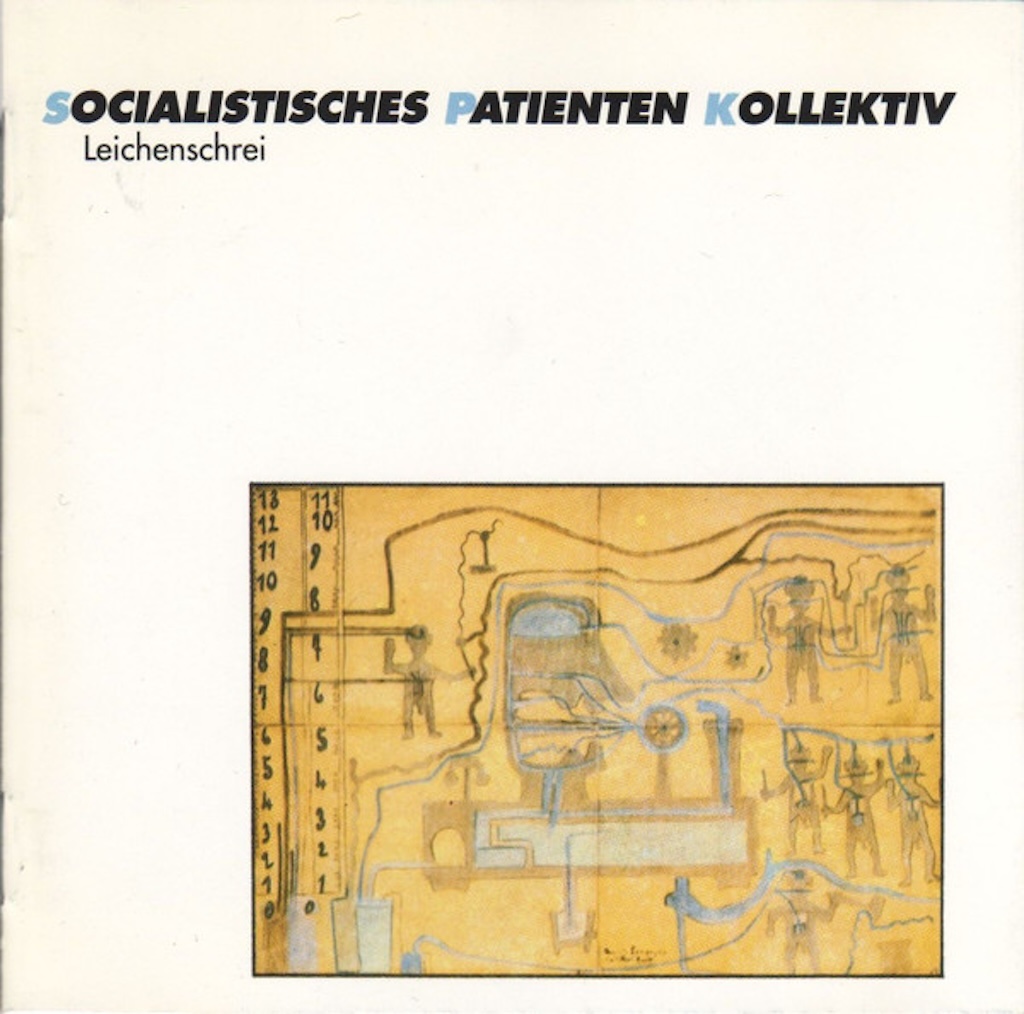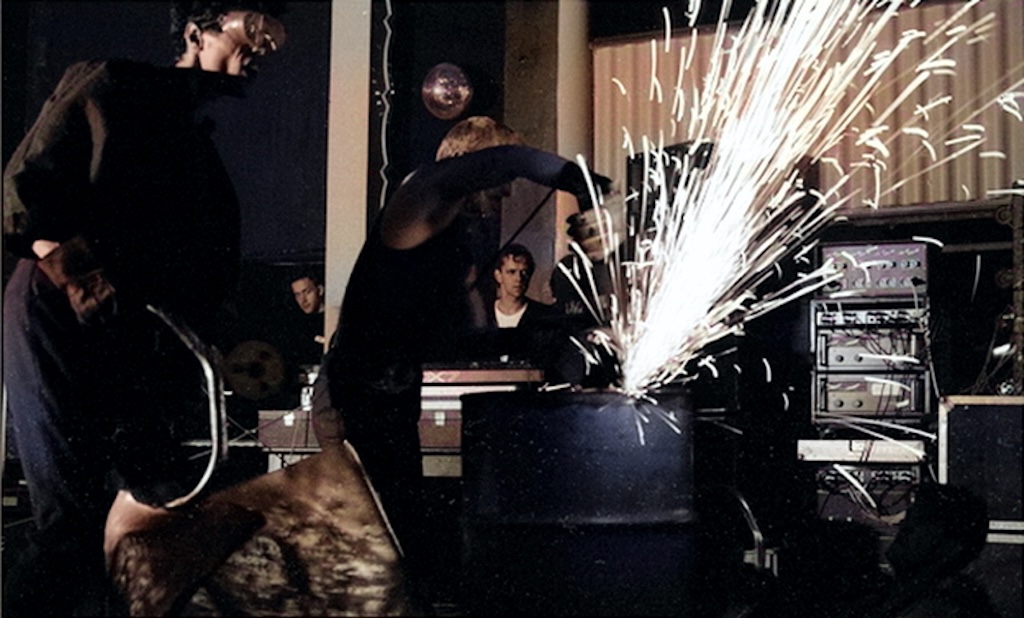SPK

”Creo que la música industrial debería haberse detenido por completo después de que SPK hiciera “Leichenschrei”, porque eso fue lo máximo, fue un álbum brillante con el que nadie pudo hacer una obra mejor, más definitiva, en la música industrial”.
Edward Ka-Spel, líder de The Legendary Pink Dots (Sommer, 2015)
La evolución de la música industrial no se puede entender sin bandas específicas como Throbbing Gristle, Neubauten, etc. Sin embargo, la banda SPK suele omitirse. Junto con Einstürzende Neuabuten introdujeron el sonido del metal crudo que inspiró a muchas bandas en los años ‘80 y ‘90. Graeme Revell y Neil Hill se conocen en una clínica psiquiátrica de Sídney a finales de los años ‘70. Una de sus inspiraciones fue el manifiesto Socialist Patients’ Collective (Surhone, 2010), que se basa en la idea de luchar contra la medicina y los médicos como enemigos de los pacientes como clase. De ahí la música y las imágenes que produjo SPK y uno de los significados de SPK, también asociado con Surgical Penis Klinik, System Planning Korporation, SePuKku, etc.
La banda trabajó en numerosos EPs, conciertos y videos entre 1978 y 1981, año en el que lanzaron el álbum “Information Overload Unit”. Este trabajo es un viaje al universo caótico que podía ofrecer la música industrial y un ataque directo a Throbbing Gristle que abandonaba su propuesta anárquica inicial y se dirigía hacia un estilo más ambient.
Einstürzende Neubauten en Europa también estaba conectado con estos sonidos relacionados con herramientas de construcción y máquinas industriales, sin embargo el universo SPK involucraba también un concepto más profundo: electrónica, samples y un imaginario grotesco unido principalmente con muerte y necropsia.
Un año después la banda lanzó uno de los mejores trabajos industriales hasta hoy – «Leichenshrei» (Grito de Cadáver). Este álbum fue subestimado durante mucho tiempo por los críticos, pero recientemente ha sido revisado y aclamado por los expertos. Probablemente el álbum fue lanzado durante un período de cambios en el circuito comercial con la irrupción del Techno Pop, New Wave o definitivamente debido a que su estilo musical era completamente impopular.
“Leichenschrei” es un producto oscuro, muy oscuro, pero increíblemente atractivo e interesante. Comienza con “Genetic Transmission”, un pasaje atmosférico con voces que hablan de cadáveres, “Post-Mortem” y “Desolation” también son temas con voces de personas que describen alucinaciones, control mental, etc. Hasta ahora, este álbum es un trabajo diferente de SPK. No es un ataque de ruido sino una nueva propuesta de música industrial que recién se tomó en los años 90. Estoy pensando en proyectos como Download o GGFH (Global Genocide Forget Heaven). El álbum en general se basa en paisajes electrónicos llenos de samples y voces distorsionadas. Lo gracioso es que Genesis P Orridge participó en muchos de estos proyectos; en mi opinión, el álbum “Puppy Gristle” suena como un tributo a SPK.
El tema Israel suena completamente futurista, la composición recuerda inmediatamente a NIN o a cualquier banda de metal industrial de los años ‘90. Otro tema sorprendente es “Day of Pigs” que incluye un conjunto de diferentes percusiones y samples que se fusionan en un tema notable llamado “Wars of Islam”, un caos electrónico.
Después de este álbum, SPK sufrió la pérdida de uno de sus miembros, Neil Hill. Esto provocó un cambio en su dirección musical, Revell y Sinan Leong, la nueva vocalista de la banda, llevaron a SPK hacia pistas de synth pop y dance-rock con un éxito moderado. Sin embargo, dos años después Revell produjo un álbum de ambient, “Zamia Lehmanni: Songs of Byzantine Flowers”, que marcó el final de SPK.
SPK debiese ser considerado como una de las bandas más influyentes en el movimiento industrial, contribuyeron mucho en la escena europea, pensemos por ejemplo en Test Dept. cuyos miembros también abrazaron ideas políticas y filosóficas o futuras bandas como los canadienses Skinny Puppy o Ministry, estas bandas evolucionaron desde sonidos synth pop a ser grandes referentes industriales.

“I think industrial music should have stopped completely after SPK made ‘Leichenschrei’ because that was the ultimate, it was a brilliant album that nobody could make a better, more definitive work in industrial music.”
The Legendary Pink Dots’ frontman Edward Ka-Spel (Sommer, 2015)
Industrial music evolution cannot be understood without specific bands such as: Throbbing Gristle, Neubauten, etc. However, the band SPK is usually omitted. They along with Einstürzende Neuabuten introduced the raw metal noise which inspired many bands in the 80s and 90s. Graeme Revell and Neil Hill met in a psychiatric clinic in Sydney in the late 70s. One of their inspirations was the manifesto called Socialist Patients’ Collective (Surhone, 2010) which is based on the idea of fighting against medicine and doctors as enemies of the patients’ class. Hence, the music and images SPK produced and one of meaning of SPK, also associated with Surgical Penis Klinik, System Planning Korporation, SePuKku, etc.
The band worked in many EPs, concerts and videos between 1978 and 1981- the year they released the album ‘Information Overload Unit.’ This work is a trip to the chaotic universe industrial music could offer and a direct attack to Throbbing Gristle who were giving up their initial anarchic proposal and moving to a more ambient style.
Einstürzende Neubauten in Europe was also connected with these experimental sounds related to construction tools and factory machines, nevertheless SPK universe involved a deeper concept: electronics, samples and a grotesque imaginary mainly connected with death and necropsy.
A year after, the band released one of the best industrial works, ‘Leichenshrei’ (1982, Corpse Scream). This album was underrated during a long time by critics but revisited and acclaimed by experts later. Probably the album was released during a period of changes in the commercial mainstream with the irruption of Techno Pop, New Wave or maybe due to the completely unpopular musical style of the album.
‘Leichenshrei’ is a dark, dark product, but incredible attractive and interesting. It starts with ‘Genetic Transmission,’ atmospheric passage with voices talking about dead bodies, ‘Post-Mortem’ and ‘Desolation’ are also tracks with people voices who describe hallucinations, mind control, etc. So far this album is a different SPK work. It’s not a noise attack but a new industrial music proposal which was just taken in the 90s. I’m thinking in projects such as Download or GGFH (Global Genocide Forget Heaven). It means electronic landscapes full of samples and distorted voices. The funny part is that Genesis P Orridge participated in many of these projects- in my opinion, the album ‘Puppy Gristle’ sounds like a tribute to SPK.
The track ‘Israel’ sounds completely futuristic, the composition recalls immediately NIN or any industrial metal band from the 90s. Another amazing track is ‘Day of Pigs’ which includes a set of different percussions and samples that merge in a remarkable track called ‘Wars of Islam,’ an electronic chaos.
After this album, SPK suffered the lost of one of his members, Neil Hill. This provoked a change in their musical direction, Revell and Sinan Leong, the new band vocalist, moved SPK towards synth pop and dance-rock tracks with a moderate success. Nevertheless, two years later Ravel produced an ambient album, ‘Zamia Lehmanni: Songs of Byzantine Flowers,’ (1986) that marked the end of SPK.
SPK should be considered one of the most influential bands in the industrial movement. They influenced the European scene, think for example in Test Dept. whose members also embraced political and philosophical ideas or future bands such as the Canadian Skinny Puppy or Ministry, these bands evolved from synth pop sounds to industrial referents.
Bibliography
Sommer, B. (2015, January 22). SPK – Leichenschrei. Retrieved from The Attic: https://theatticmag.com/reviews/1359/spk-_-leichenschrei.html
Surhone, L. M. (2010). Socialist Patients’ Collective. VDM Publishing.

